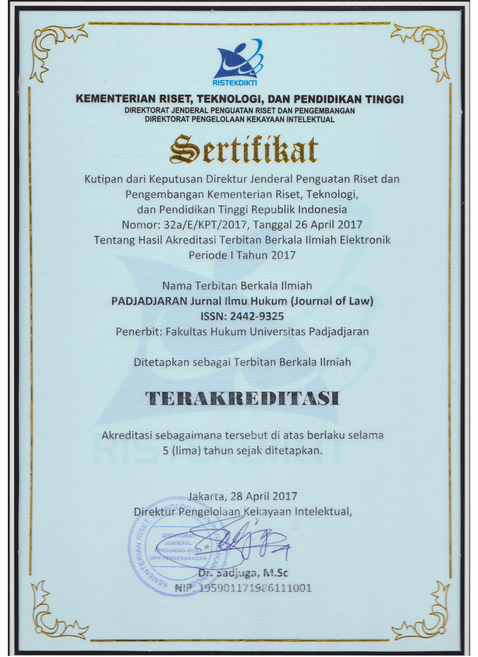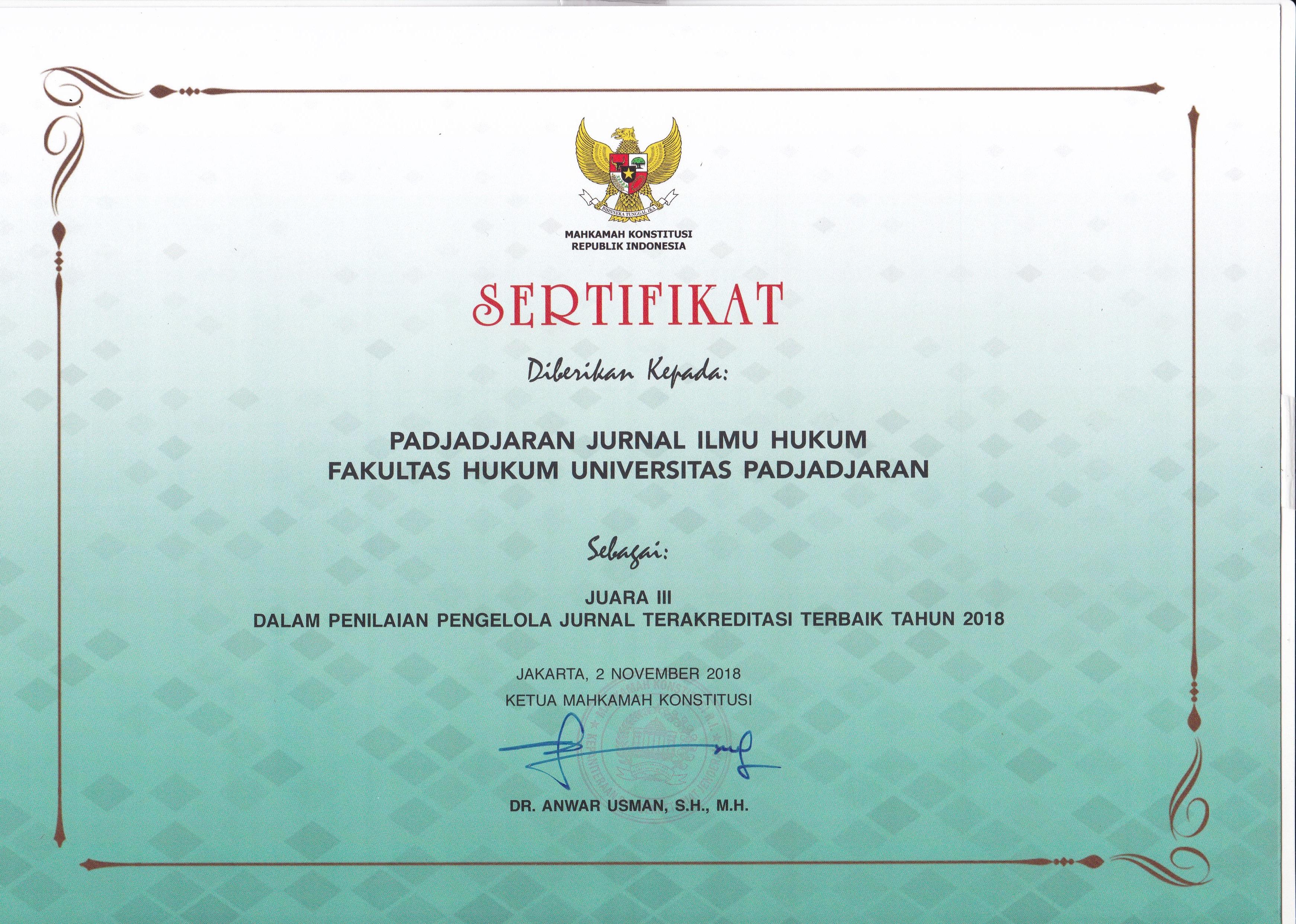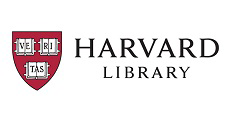- Focus and Scope
- Section Policies
- Peer Review Process
- Open Access Policy
- Archiving
- Publication Ethics and Publication Malpractice Statement
- Author Processing Charges
- Plagiarism Policy
- Indexing and Abstracting
- Copyright Transfer Agreement
Focus and Scope
Padjadjaran Jurnal Ilmu Hukum (Journal of Law) (PJIH) is a peer-reviewed journal with double blind review system. PJIH encourages all legal experts to contribute by submitting articles and/or book review on legal issues, particularly on:
- Philosophy and Theory of Law
- Comparative law
- Sociology of law
- International law
- Constitutional law
- Economic law
- Environmental law
- Criminal law
- Administration law
- Cyber law
- Human Rights law
- Agrarian law
PJIH published three editions year-round with the first edition published on April, the second edition on August, and the last edition on December. Since 2016, PJIH has been managed and published online.
Section Policies
Padjadjaran Jurnal Ilmu Hukum (Journal of Law)
Padjadjaran Journal of Law (PJIH) is an accredited, open access journal that was established in 2014. This journal is quarterly published (April, August, and December) and mostly encompasses of public law topics, ranging from law interpretation, case studies, and policy analysis, with the aim to contribute on the promotion and development of law as a response towards the rapid growth of global issues.
Peer Review Process
PADJADJARAN Jurnal Ilmu Hukum (Journal of Law) (PJIH) preview process uses a double-blind review system. First, manuscript are read by editorial members (upon the field of specialization) to meet the PJIH's criteria. Then, the manuscript will be sent to at least two anonymous reviewers. Sometimes (if required) a third peer-reviewer is also needed for further recommendation. Reviewers' comments are then sent to the corresponding author for necessary actions and responses. Finally, the Editor shall inform the author of the results of the review as soon as possible, hopefully within sixty days.
The final decision of manuscript acceptance is made by Editor in Chief (together with Editorial Board if required) according to reviewers' critical comments. PJIH has four types of decisions:
- Accepted, as it is
- Accepted by Minor Revisions (let authors revised with stipulated time)
- Accepted by Major Revisions (let authors revised with stipulated time)
- Rejected (generally, on grounds of the outside of scope and aim, major technical description problems, lack of clarity of presentation)
In reviewing submitted articles, reviewer will refer to scoring guide given by Editorial Board. Scoring format includes originality of ideas, accuracy of used theories in analysing problems, and writing method. Editor will also run a plagiarism check using Turnitin or Ithenticate for the submitted articles before sending it to the reviewers. If a manuscript has over 15% of similarity, we will send back the article to the author to be revised for the plagiarised contents.

The journal is carried out by using Mendeley as a Tool Reference Manager and Chicago Manual of Style 17th Edition (full note) as the style.
PJIH has been published online since Volume 3 year 2016. PJIH has also provided a printed edition of the publication since Volume 5 year 2018, and can be available for public upon request.
Open Access Policy
This journal provides immediate open access to its content on the principle that making research freely available to the public supports a greater global exchange of knowledge.
Archiving
This journal utilizes the LOCKSS system to create a distributed archiving system among participating libraries and permits those libraries to create permanent archives of the journal for purposes of preservation and restoration. More...
Publication Ethics and Publication Malpractice Statement
Introduction
Padjadjaran Jurnal Ilmu Hukum is a peer-reviewed and double blind reviewed journal. Published 3 editions annually (on April, August, and December), Padjadjaran Jurnal Ilmu Hukum encourages the submission of works dealing with law issues in the forms of article and book review. All authors submitting their works to the journal for publication as original articles attest that the submitted works represent their authors’ contributions and have not been copied or plagiarized in whole or in part from other works. This statement is based on COPE’s Best Practice Guidelines for Journal Editors.
Ethical Guideline for Journal Publication
The publication of an article in a peer-reviewed journal of Padjadjaran Jurnal Ilmu Hukum is an essential building block in the development of a coherent and respected network of knowledge. It is a direct reflection of the quality of the work of the authors and the institutions that support them. Peer-reviewed articles support and embody the scientific method. It is, therefore, important to agree upon standards of expected ethical behavior for all parties involved in the act of publishing: the author, the journal editor, the peer-reviewer, the publisher and the society.
Faculty of Law, Universitas Padjadjaran as the publisher of Padjadjaran Jurnal Ilmu Hukum takes its duties of guardianship over all stages of publishing seriously and we recognize our ethical behavior and other responsibilities. We are committed to ensuring that advertising, reprinting or other commercial revenue has no impact or influence on the editorial decisions. In addition, the Faculty of Law, Universitas Padjadjaran and Editorial Board will assist in communications with other journals and/or publishers where this is useful and necessary.
Allegations of Research Misconduct
Research misconduct means fabrication, falsification, citation manipulation, or plagiarism in producing, performing, or reviewing research and writing an article by authors, or in reporting research results. When authors are found to have been involved with research misconduct or other serious irregularities involving articles that have been published in scientific journals, Editors have a responsibility to ensure the accuracy and integrity of the scientific record.
In cases of suspected misconduct, the Editors and Editorial Board will use the best practices of COPE to assist them to resolve the complaint and address the misconduct fairly. This will include an investigation of the allegation by the Editors. A submitted manuscript that is found to contain such misconduct will be rejected. In cases where a published paper is found to contain such misconduct, a retraction can be published and will be linked to the original article.
The first step involves determining the validity of the allegation and an assessment of whether the allegation is consistent with the definition of research misconduct. This initial step also involves determining whether the individuals alleging misconduct have relevant conflicts of interest.
If scientific misconduct or the presence of other substantial research irregularities is a possibility, the allegations are shared with the corresponding author, who, on behalf of all of the coauthors, is requested to provide a detailed response. After the response is received and evaluated, additional review and involvement of experts (such as statistical reviewers) may be obtained. For cases in which it is unlikely that misconduct has occurred, clarifications, additional analyses, or both, published as letters to the editor, and often including a correction notice and correction to the published article are sufficient.
Institutions are expected to conduct an appropriate and thorough investigation of allegations of scientific misconduct. Ultimately, authors, journals, and institutions have an important obligation to ensure the accuracy of the scientific record. By responding appropriately to concerns about scientific misconduct, and taking necessary actions based on evaluation of these concerns, such as corrections, retractions with replacement, and retractions, Padjadjaran Jurnal Ilmu Hukum will continue to fulfill the responsibilities of ensuring the validity and integrity of the scientific record.
Publication decisions
The editor of the Padjadjaran Jurnal Ilmu Hukum is responsible for deciding which of the articles submitted to the journal should be published. The validation of the work in question and its importance to researchers and readers must always drive such decisions. The editors may be guided by the policies of the journal's editorial board and constrained by such legal requirements as shall then be in force regarding libel, copyright infringement and plagiarism. The editors may confer with other editors or reviewers in making this decision.
Complaints and Appeals
Padjadjaran Jurnal Ilmu Hukum will have a clear procedure for handling complaints against the journal, Editorial Staff, Editorial Board or Publisher. The complaints will be clarified to a respected person with respect to the case of complaint. The scope of complaints includes anything related to the journal business process, i.e. editorial process, found citation manipulation, unfair editor/reviewer, peer-review manipulation, etc. The complaint cases will be processed according to COPE guideline. The complaint cases should be sent by email to: padjadjaranjournal@gmail.com
Fair play
The editor at any time evaluates manuscripts for their intellectual content without regard to race, gender, sexual orientation, religious belief, ethnic origin, citizenship, or political philosophy of the authors.
Confidentiality
The editor and any editorial staff must not disclose any information about a submitted manuscript to anyone other than the corresponding author, reviewers, potential reviewers, other editorial advisers, and the publisher, as appropriate.
Disclosure and conflicts of interest
Unpublished materials disclosed in a submitted manuscript must not be used in an editor's own research without the express written consent of the author.
Duties of Reviewers
Contribution to Editorial Decisions. Peer review assists the editor in making editorial decisions and through the editorial communications with the author may also assist the author in improving the paper.
Promptness. Any selected referee who feels unqualified to review the research reported in a manuscript or knows that its prompt review will be impossible should notify the editor and excuse himself from the review process.
Confidentiality. Any manuscripts received for review must be treated as confidential documents. They must not be shown to or discussed with others except as authorized by the editor.
Standards of Objectivity. Reviews should be conducted objectively. Personal criticism of the author is inappropriate. Referees should express their views clearly with supporting arguments.
Acknowledgment of Sources. Reviewers should identify relevant published work that has not been cited by the authors. Any statement that an observation, derivation, or argument had been previously reported should be accompanied by the relevant citation. A reviewer should also call to the editor's attention any substantial similarity or overlap between the manuscript under consideration and any other published paper of which they have personal knowledge.
Disclosure and Conflict of Interest. Privileged information or ideas obtained through peer review must be kept confidential and not used for personal advantage. Reviewers should not consider manuscripts in which they have conflicts of interest resulting from competitive, collaborative, or other relationships or connections with any of the authors, companies, or institutions connected to the papers.
Duties of Authors
Reporting standards. Authors of reports of original research should present an accurate account of the work performed as well as an objective discussion of its significance. Underlying data should be represented accurately in the paper. A paper should contain sufficient detail and references to permit others to replicate the work. Fraudulent or knowingly inaccurate statements constitute unethical behavior and are unacceptable.
Originality and Plagiarism. The authors should ensure that they have written entirely original works, and if the authors have used the work and/or words of others that this has been appropriately cited or quoted.
Multiple, Redundant or Concurrent Publication. An author should not, in general, publish manuscripts describing essentially the same research in more than one journal or primary publication. Submitting the same manuscript to more than one journal concurrently constitutes unethical publishing behavior and is unacceptable.
Acknowledgment of Sources. Proper acknowledgment of the work of others must always be given. Authors should cite publications that have been influential in determining the nature of the reported work.
Authorship of the Paper. Authorship should be limited to those who have made a significant contribution to the conception, design, execution, or interpretation of the reported study. All those who have made significant contributions should be listed as co-authors. Where there are others who have participated in certain substantive aspects of the research project, they should be acknowledged or listed as contributors. The corresponding author should ensure that all appropriate co-authors and no inappropriate co-authors are included on the paper and that all co-authors have seen and approved the final version of the paper and have agreed to its submission for publication.
Disclosure and Conflicts of Interest. All authors should disclose in their manuscript any financial or other substantive conflicts of interest that might be construed to influence the results or interpretation of their manuscript. All sources of financial support for the project should be disclosed.
Fundamental Errors in Published Works. When an author discovers a significant error or inaccuracy in his/her own published work, it is the author’s obligation to promptly notify the journal editor or publisher and cooperate with the editor to retract or correct the paper.
Post-Publication Discussions and Correction
Padjadjaran Jurnal Ilmu Hukum (Journal of Law) accepts discussion and corrections on published articles by reader. In case the reader giving discussions and corrections toward a published article, the reader can contact by email to Editor in Chief by explaining the discussions and corrections. If accepted (by Editor in Chief), the discussions and correction will be published in next issue as Letter to Editor. Respected Authors can reply/answer the discussions and corrections from the reader by sending the reply to Editor in Chief. Therefore, Editors may publish the answer as Reply to Letter to Editor.
Author Processing Charges
Please be aware that Padjadjaran Jurnal Ilmu Hukum (Journal of Law) is a fully Open Access journal and as such, requires payment of a publication fee by the author. All articles published Open Access will be immediately and permanently free for everyone to read, download, copy, distribute and use online.
The open access publication fees for this journal are as follows:
- Rp3.000.000 for internal author (Lecturers from Universitas Padjadjaran); and
- Rp3.500.000 (US$300) for external author.
Payment must be made prior to publication.
Language
We only accept manuscript that is written in English. Furthermore, please attach the proofreading certificate when you submit your article.
Plagiarism Policy
Every manuscript submitted for publication in Padjadjaran Jurnal Ilmu Hukum is checked for plagiarism after submission and before being sent to reviewer for double blind review.
Padjadjaran Jurnal Ilmu Hukum uses 'Turnitin Software' to detect instances of overlapping and similar texts in submitted manuscripts.
The manuscripts in which plagiarism is detected are handled based on the extent of plagiarism present in the manuscript:
- Manuscript with plagiarism number of less than 15% will be continued in the review process by reviewer;
- Manuscript with more than 15% plagiarism count will be returned to the author. The authors are advised to revise the plagiarized parts of the manuscript and resubmit it as a new manuscript.
Indexing and Abstracting
1. Science and Technology Index (SINTA 1)
2. PUBLONS – Web of Science Group
3. Directory of Open Access Journals (DOAJ)
5. DIMENSIONS
6. University of Birmingham Libraries
7. University of Edinburgh Libraries
8. JISC Library Hub Discover, United Kingdom
9. Aberystwyth University Library
10. University of the Arts, London
12. University of Bath Library
13. Cardiff Metropolitan University
14. Cardiff University Libraries
16. Glasgow Caledonian University
17. University of Huddersfield Library
18. Imperial College London Library
19. LSE Library
20. University of Leicester Library
21. London School of Hygiene and Tropical Medicine
22. University of Manchester Library
23. National Library of Scotland
24. National Library of Wales / Llyfrgell Genedlaethol Cymru
25. Newcastle University Libraries
26. Northumbria University Library
28. Royal Holloway, University of London
29. Sheffield Hallam University Library
31. University of Sheffield Library
32. University of St Andrews Library
33. University of Strathclyde Library
37. University of York Libraries
Copyright Transfer Agreement
The Authors submitting a manuscript do so on the understanding that if accepted for publication, copyright publishing of the article shall be assigned to Padjadjaran Jurnal Ilmu Hukum (Journal of Law), Faculty of Law, Universitas Padjadjaran as the publishers of the journal.
Copyright encompasses exclusive rights to reproduce and deliver the article in all form and media, including reprints, photographs, microfilms, and any other similar reproductions, as well as translations. The reproduction of any part of this journal, its storage in databases and its transmission by any form or media, such as electronic, electrostatic and mechanical copies, photocopies, recordings, magnetic media, etc., will be allowed only with written permission from Padjadjaran Jurnal Ilmu Hukum (Journal of Law), Faculty of Law, Universitas Padjadjaran.
Padjadjaran Jurnal Ilmu Hukum (Journal of Law), the Editors and the Advisory International Editorial Board make every effort to ensure that no wrong or misleading data, opinions or statements be published in the journal. In any way, the contents of the articles and advertisements published in the Padjadjaran Jurnal Ilmu Hukum (Journal of Law) are sole and exclusive responsibility of their respective authors and advertisers.
Remember, even though we ask for a transfer of copyright, our journal authors retain (or are granted back) significant scholarly rights.
The Copyright Transfer Form can be downloaded here: [Copyright Transfer Agreement]
The copyright form should be signed originally and send to the Editorial Office in the form of original mail, scanned document or fax

















